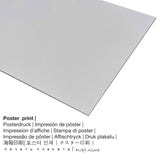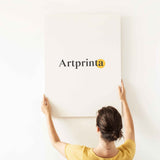Ferdinand Bol, 1668 - Portrait of the Three Regentesses of the Leprozenhuis - fine art print
Taxes incluses. Frais de port calculés au paiement.
Information about the product
Portrait of the Three Regentesses of the Leprozenhuis is a piece of art made by the baroque painter Ferdinand Bol. Today, this work of art can be viewed in in the Rijksmuseum's art collection, which is the largest museum for Dutch art and history from the Middle Ages to the present day. With courtesy of: Rijksmuseum (public domain license).The creditline of the artwork is the following: . In addition to that, the alignment is landscape and has an aspect ratio of 1.2 : 1, meaning that the length is 20% longer than the width. The painter, etcher Ferdinand Bol was an artist, whose artistic style can be classified as Baroque. The European painter was born in 1616 in Dordrecht, South Holland, Netherlands and deceased at the age of 64 in the year 1680 in Amsterdam, North Holland, Netherlands.
Materials you can pick from
In the dropdown selection right next to the product offering you can select a material and a sizeaccording to your individual preferences. In order match your personal requirements perfectly, you can choose among the following product customization options:
- Acrylic glass print (with real glass coating): An acrylic glass print, often denoted as a plexiglass print, will convert the original into home décor and offers a good alternative option to dibond or canvas prints.
- The poster print on canvas material: A poster is a printed sheet of canvas paper with a granular surface structure, which resembles the actual work of art. Please bear in mind, that depending on the absolute size of the poster print we add a white margin 2-6cm around the artwork, which facilitates the framing with a custom frame.
- Canvas: The canvas print, which shall not be mistaken with a canvas painting, is a digital copy printed on an industrial printer. A canvas generates the special impression of three-dimensionality. Canvas Prints have the advantage of being relatively low in weight. This means, it is quite simple to hang your Canvas print without the help of extra wall-mounts. Canvas prints are suitable for all kinds of walls.
- Aluminium dibond (metal print): Aluminium Dibond prints are metal prints with an outstanding effect of depth. The non-reflective surface structure creates a fashionable look. The Aluminium Dibond Print is your best introduction to art reproductions on aluminum. The colors of the print are bright and luminous in the highest definition, the fine details appear crisp, and the print has a a matte appearance that you can literally feel.
Disclaimer: We try our utmost in order to depict our products as exact as possible and to illustrate them visually in our shop. Nonetheless, the pigments of the printed materials and the printing may vary marginally from the presentation on your monitor. Depending on your settings of your screen and the nature of the surface, not all colors are printed 100% realistically. Bearing in mind that our are printed and processed manually, there may as well be slight deviations in the size and exact position of the motif.
Product details
| Print product type: | fine art reproduction |
| Method of reproduction: | digital reproduction |
| Manufacturing method: | UV direct print (digital printing) |
| Product Origin: | Germany |
| Type of stock: | on demand production |
| Proposed product use: | art print gallery, gallery wall |
| Artwork alignment: | landscape format |
| Side ratio: | 1.2 : 1 - length : width |
| Aspect ratio implication: | the length is 20% longer than the width |
| Available choices: | metal print (aluminium dibond), canvas print, poster print (canvas paper), acrylic glass print (with real glass coating) |
| Canvas on stretcher frame (canvas print) size options: | 60x50cm - 24x20", 120x100cm - 47x39" |
| Acrylic glass print (with real glass coating) size options: | 60x50cm - 24x20", 120x100cm - 47x39" |
| Poster print (canvas paper): | 60x50cm - 24x20", 120x100cm - 47x39" |
| Dibond print (alumnium material) size options: | 60x50cm - 24x20", 120x100cm - 47x39" |
| Art print framing: | please note that this reproduction does not have a frame |
Artwork table
| Title of the painting: | "Portrait of the Three Regentesses of the Leprozenhuis" |
| Artwork classification: | painting |
| General category: | classic art |
| Period: | 17th century |
| Year: | 1668 |
| Approximate age of artwork: | more than 350 years |
| Museum / collection: | Rijksmuseum |
| Place of museum: | Amsterdam, Netherlands |
| Available under: | www.rijksmuseum.nl |
| License of artwork: | public domain |
| Courtesy of: | Rijksmuseum |
Artist summary
| Name of the artist: | Ferdinand Bol |
| Alternative names: | Ferdinand Bol, bol ferdinand, F. Bol, Boll, Ferdin. Boll, Ferdinand Bole, Bol, Ferdinandus Bol, bol ferd., Fradi[nand] Bol, בול פרדיננד, Ferd Bole, Ferdinard Boll, Pol, Ferd. Bol, T. Bol, F. Ball, F: Bol, Frances Bolls, F.Bol, Ferdinand Balle, Pool Ferdinand, Ferdinandus Boll, Fradinand Bol, Ferdinando Bool, Fer. Bol, Ferdinand Ball, P. Bol, Pool, Ferdinand Bool, Francis Ball, J. Boll, bol f., Ferdinand-Bol, Bol Ferdinand, ferd. bool, Mre. De Ferd. Bol., Ferd. Boll, Ferdinand Bull, F. Bols, F. Boll, Ferdinand Pol, Fr. Bol, François Bool, Ferdinand Boll |
| Artist gender: | male |
| Artist nationality: | Dutch |
| Professions of the artist: | etcher, painter |
| Home country: | the Netherlands |
| Classification: | old master |
| Art styles: | Baroque |
| Life span: | 64 years |
| Birth year: | 1616 |
| Hometown: | Dordrecht, South Holland, Netherlands |
| Died in the year: | 1680 |
| Place of death: | Amsterdam, North Holland, Netherlands |
© Copyrighted by - www.artprinta.com (Artprinta)
Artwork depiction from Rijksmuseum website (© - by Rijksmuseum - www.rijksmuseum.nl)
The Lepers’ Asylum originally took in patients suffering from leprosy. Since that infectious disease rarely still occurred during the 17th century, people with other afflictions were also cared for there. Three regentesses took charge of the day-to-day running of the institution, from overseeing servants to purchasing goods. Bol painted them seated at a table set before a plain back wall. Their identities are known from the family arms on the chimneypiece, above which the painting hung.














